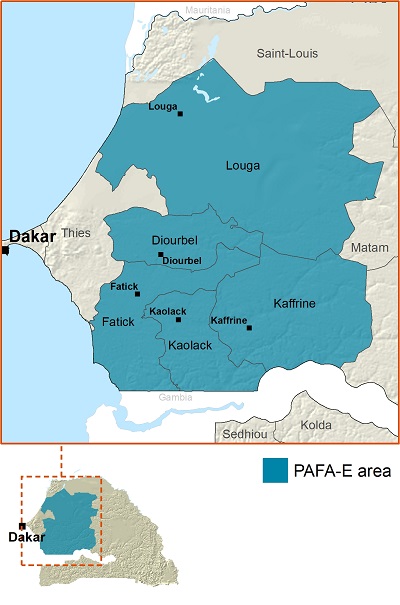Agricultural Value Chains Support Project – Extension
IFAD Asset Request Portlet
Agrégateur de contenus
Agricultural Value Chains Support Project-Extension
The overall objective of this project is to contribute to a sustainable improvement in the livelihoods of family farms in the country's central and northern groundnut basin and the western silvo-pastoral zone, through their incorporation into diversified, profitable value chains.
Specifically, the project aims to sustainably improve the food security and income of small-scale producers – including both farmers and herders – and create remunerative, sustainable jobs in rural communities. It focuses on expanding the access of smallholders and their organizations to effective services and production infrastructure, appropriate technologies and markets.
The project zone represents 27 per cent of the country's land area and encompasses 35 per cent of its population, with a large proportion of young people and women. The target group encompasses members of farmers' and herders' organizations and other economic actors, including micro- and small rural enterprises, market operators, and public and private structures providing products and services needed for development of the targeted value chains.
As part of the IFAD country programme, the project builds on the achievements of the ongoing agricultural Value Chains Support Project and previous IFAD-supported projects, including the Rural Microenterprise Support Project, the Agricultural Development Project in Matam, the Village Management and Development Project and the Village Organization and Management Project.

Rapports du Président
Rapports du Président
Rapports de conception du projet
Documents de supervision et d'appui à l'exécution
Documents de supervision et d'appui à l'exécution
Mission de supervision, October 2016
Rapport de supervision avril 2016
Rapport de supervision, novembre 2015
Mission de supervision, mai 2015
Rapport de Supervision, Mai 2015
Étude de l'impact environnemental et social
Cadre de gestion environnementale et sociale
Rapport sur l'examen à mi-parcours
Rapport sur l'examen à mi-parcours
Cadre d’action de réinstallation
Condensé de rapport d'achèvement de projet
Études spéciales
Liste de projets
Audit et états financiers
Rapport d'achèvement de projet
Rapport d'achèvement de projet
Co-financeurs
À propos du projet
À propos du projet
Le miel et les huîtres, deux produits qui vont très bien ensemble dans le delta du Saloum au Sénégal
Dans la forêt de mangrove du delta du Saloum la beauté des paysages le dispute à la richesse de la biodiversit. Ellle a pourtant souffert d'années de déforestation, perturbant l'écosystème de la région et menaçant les moyens d’existence des agriculteurs et des pêcheurs de la région. Récemment, un projet de collaboration a commencé à s'attaquer à ces deux problèmes en finançant une restauration de la mangrove et en soutenant les associations d'agriculteurs locaux.
Comment un meilleur accès à l'eau peut rapprocher le Sahel du développement durable
Dans la région de Louga au Sénégal, Dienaba Sow parcourt chaque jour trois kilomètres et demi pour se rendre de son village de Hodio à Toung, où elle va chercher l’eau dont a besoin sa famille.